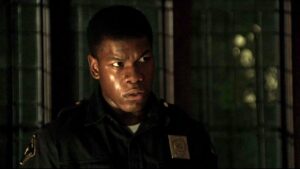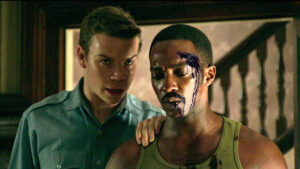Detroit (2017) review
Dir. Kathryn Bigelow
By: Steve Pulaski
Rating: ★★★½
Kathryn Bigelow’s Detroit plunges us into the middle of the brutally violent 1967 Detroit riots, which claimed the lives of over two dozen, mostly black, men and women and left hundreds more wounded. More specifically chronicling the events that turned Detroit’s famous 12th Street into an unrecognizable warzone, engulfed by the flames of businesses and characterized by violence by both police and distressed locals, Bigelow and screenwriter Mark Boal zero in on an incident that occurred at the Algiers Motel in July of that year. It’s now the 50th anniversary of such event and it doesn’t seem like we’ve learned much.
These are the thoughts that run through your mind as you sit watching Bigelow’s extremely well-choreographed movie that operates like a cinematic powder-keg ready to blow up and destroy anyone and everything in its path. Not since John Singleton’s grossly underrated illustration of the Rosewood massacre in his 1997 film Rosewood has their been such a sweeping, dynamic display of unrest and miserable violence across a vast location.
For the first half-hour, Bigelow and Boal tag the bases to show a predominately African-American city patrolled by white police officers known for their aggression and excessive use of force. We see dozens of angry men and women charging the streets, so venomous and filled with fear foreign to most of us that they will set fire to their own town square and city-streets. Their silence and complacency has gotten them nowhere.

At the Algiers Motel during all this chaos, we see Larry Reed (Algee Smith), the lead singer of the Motown group The Dramatics, and his fellow bandmember Fred (Jacob Latimore) bump into two white women (Hannah Murray and Kaitlyn Dever), who take them back to their friends’ hotel-room. After a joke goes too far, Larry, Fred, and the girls depart and, one of the men, Carl (Straight Outta Compton‘s Jason Mitchell) becomes cocky, firing a starter gun out of the motel window to frighten nearby police officers and National Guardsmen. The shots are interpreted as an active duty sniper, and the Detroit Police Department makes an effort to storm the annex of the Algiers and apprehend everyone inside.
This results in Larry, Fred, the women, and several other men being forced against the wall of the lobby by an unhinged, racist police officer (Will Poulter) and his backup in order to determine who fired the shots. During what the officers determine is nothing more than a conscious effort to keep quiet, the men begin using cruel interrogation tactics in order to get a rise out of the men. They take them one-by-one inside rooms to make it seem to the men in the hallway as if their friends were murdered in cold blood in hopes for a confession. This goes on for what feels like hours in an exhaustive display of crying and shouting, with a humble, African-American security guard named Melvin (John Boyega) watching this abuse of power unfold.
What happened at the Algiers Motel that fateful July night is still not historically conclusive, and Detroit admits right before the credits roll that the filmmakers did dramatize some events based on documentation and witness accounts. The unfortunate part is never does the film feel overreaching or unrealistic. It traps its audience much like the innocent men and women inside the Algiers, forcing them to watch the ugly treatment of people while more gunfire and explosives zip through the ordinarily quiet air outside of the motel. For a good portion of the film, we feel as hopeless as these young men do as we see the vicious treatment of them shown in an unflinching manner.

The performances are solid across the board, particularly from Will Poulter, who assumes what is probably the toughest role of the 24-year-old’s career up until this point and could very well be the toughest role in his entire career. Poulter, after appearing as a background role in several movies and TV shows, including We’re the Millers, finally gets the spotlight on him in an contemptible, caustic role that instills fear into audiences and actors as if he’s Freddy Krueger in the flesh. Boyega and Anthony Mackie, in a role of few words, also show their talents, particularly with Boyega honing his sharp skill of letting his eyes and body language do a good majority of the talking, especially in the film’s most climactic moments. Even Murray and Dever, who, at one point, have their roles marked by who can let out the loudest blood-curdling scream, show that they too could have long, sustained acting careers.
But the saddest thing about Detroit is this should be a time capsule movie. The kind of film we look at like 12 Years a Slave or Lincoln and quietly whisper to ourselves, “that’s crazy, how could they do that?” or even uttering the more debatable, “that doesn’t happen today, thank God.” But instead, Detroit is a movie about a problem that is still prominent today; still interwoven in the fabric of America bearing the same disgraceful, inconsequential outcome. After addressing a costly war’s effect on soldiers in addition to the largest terrorist manhunt in the history of the United States, Bigelow turns her camera on a much more difficult domestic problem that has claimed many innocent lives. Although its name, “police brutality,” is becoming a bigger buzzword in the zeitgeist, it’s not meriting any easy fixes or any kind of fast-action in terms of legal repercussions to prevent such incidents from ever becoming incidents in the first place.
Detroit may not be the movie you want to sit through during your weekend after a presumably long, stressful week, but it’s a film more important than any other one playing in your local multiplex right now. Thanks to an incendiary premise with a ton of well-paced suspense, an ensemble of recognizable and relatively new faces, and a socially relevant premise that could play well alongside this year’s other big, racially charged winner Get Out, it nails its goal of being a current horror movie for these shaken times of unrest that might not reflect the violence of 1967, but aren’t inspiring portraits of uplifting times either.
NOTE: Below are two segments from my radio show, Sleepless with Steve, concerning Detroit:
Starring: John Boyega, Will Poulter, Algee Smith, Jacob Latimore, Anthony Mackie, Hannah Murray, Kaitlyn Dever, and Jason Mitchell. Directed by: Kathryn Bigelow.
About Steve Pulaski
Steve Pulaski has been reviewing movies since 2009 for a barrage of different outlets. He graduated North Central College in 2018 and currently works as an on-air radio personality. He also hosts a weekly movie podcast called "Sleepless with Steve," dedicated to film and the film industry, on his YouTube channel. In addition to writing, he's a die-hard Chicago Bears fan and has two cats, appropriately named Siskel and Ebert!


